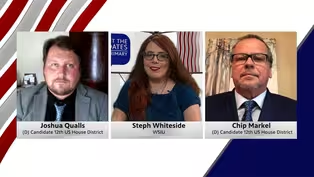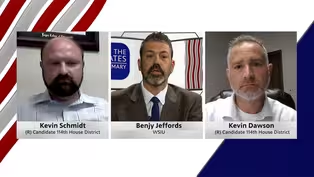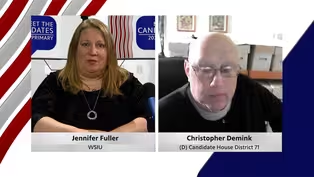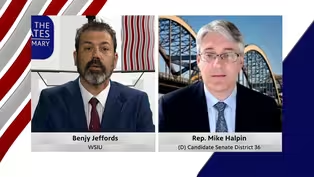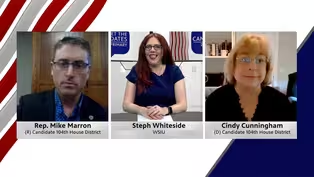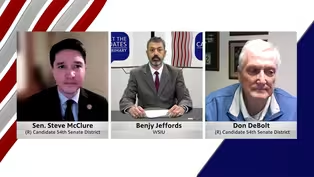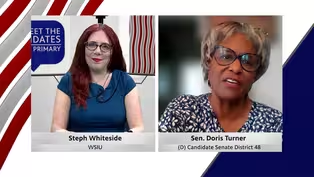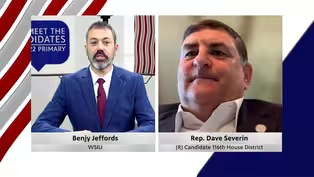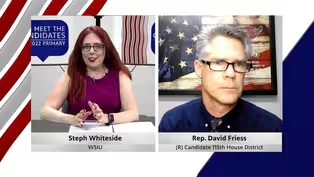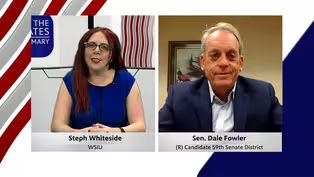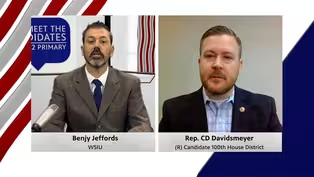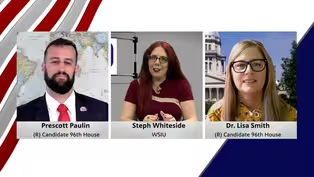Meet the Candidates
95th Illinois House District Primary Republican Candidates
5/19/2022 | 26m 58sVideo has Closed Captions
Representative Tim Butler and Kent Gray, running for the 95th House District.
Ahead of the June primary, WSIU sat down with Representative Tim Butler and Kent Gray, running for the 95th House District.
Problems playing video? | Closed Captioning Feedback
Problems playing video? | Closed Captioning Feedback
Meet the Candidates is a local public television program presented by WSIU
This series is produced in partnership with the League of Women Voters
Meet the Candidates
95th Illinois House District Primary Republican Candidates
5/19/2022 | 26m 58sVideo has Closed Captions
Ahead of the June primary, WSIU sat down with Representative Tim Butler and Kent Gray, running for the 95th House District.
Problems playing video? | Closed Captioning Feedback
How to Watch Meet the Candidates
Meet the Candidates is available to stream on pbs.org and the free PBS App, available on iPhone, Apple TV, Android TV, Android smartphones, Amazon Fire TV, Amazon Fire Tablet, Roku, Samsung Smart TV, and Vizio.
Providing Support for PBS.org
Learn Moreabout PBS online sponsorshipMore from This Collection
Meet the Candidates features interviews with candidates running for Illinois state, House and Senate races. Guests will discuss key issues impacting Illinois voters such as the economy, the environment, education and public health. This series is produced in partnership with the League of Women Voters.
12th U.S. Congressional Seat Primary Candidate Forum
Video has Closed Captions
Joshua Qualls and Chip Markel, running for the 12th U.S. Congressional Seat. (25m 21s)
114th Illinois House District Primary Candidate Forum
Video has Closed Captions
Dr. Kevin Schmidt and Kevin Dawson, running for the 114th House District. (25m 57s)
71st House District Primary Candidate
Video has Closed Captions
Ahead of the June primary, WSIU talked with Christopher Demink, running for the 71st House (21m 35s)
36th Senate District Primary Candidate Forum
Video has Closed Captions
WSIU talked with 36th Senate District candidate Representative Mike Halpin. (26m 29s)
104th Illinois House District Primary Candidates
Video has Closed Captions
104th House District candidates Representative (R) Mike Marron and (D) Cindy Cunningham. (26m 49s)
54th Illinois Senate District Primary Republican Candidates
Video has Closed Captions
54th Illinois Senate District Primary Republican Candidates forum. (25m)
48th Illinois Senate District Primary Democrat Candidates
Video has Closed Captions
48th Illinois Senate District Primary Democrat Candidates forum. (26m 46s)
116th Illinois House District Primary Republican Candidates
Video has Closed Captions
116th Illinois House District Primary Republican Candidates forum. (25m 9s)
115th Illinois House District Primary Republican Candidates
Video has Closed Captions
115th Illinois House District Primary Republican Candidates forum. (23m 14s)
59th Illinois Senate District Primary Republican Candidate
Video has Closed Captions
WSIU interviews Senator Dale Fowler from the 59th Senate District. (27m 29s)
100th Illinois House District Primary Republican Candidates
Video has Closed Captions
WSIU interviews candidate C.D. Davidsmeyer, running for the 100th House seat. (26m 9s)
96th Illinois House District Primary Republican Candidates
Video has Closed Captions
Candidates Prescott Paulin and Dr. Lisa Smith, running for the 96th House seat. (28m 45s)
Providing Support for PBS.org
Learn Moreabout PBS online sponsorship(upbeat music) (dramatic music) - This is "Meet The Candidates" with primary candidates for the 95th house district.
I'm Benjy Jeffords.
WSIU public broadcasting and the League of Women's Voters are pleased to host today's forum.
The rules are simple.
Each candidate will have 60 seconds to answer the question, and should not mention their opponent in their response.
Joining us today are Representative Tim Butler and Kent Gray.
Thank you so much for joining us.
Representative Butler, we'll start with you.
What is your number one priority of elected?
I know it can be hard to narrow it down, but please try to stick to just one.
- Yeah, well thank you Benjy, and really thanks to WSIU and all the public TV stations from down state for doing this.
You guys do great things, including things like "Illinois Lawmakers" and then "CapitolView" that do a great job informing the public.
So look, the first thing that I think that is the number one priority is the economy, and attracting jobs to the state of Illinois.
I look at my own family, my six siblings, five of whom have moved outta state for job opportunities.
That just underscores how 50 plus years of democratic real legislature has created policies that don't bring jobs to Illinois.
If we're gonna have a state that's gonna compete, if we're gonna have a state that's gonna grow, if we're gonna have a state that adds people to our population, which didn't happen this last census, we need to create jobs.
We need to create jobs downstate, and we need to have good policies that help those businesses grow, and attract more people to our state.
- Thank you Representative Butler, and Mr. Gray.
- Well good morning Benjy, and thanks for having us on, it's great to be with you this morning.
The number one issue facing Illinois is the hollowing out of our economy and our population.
We are losing folks to other states that are frankly beating us on efficiency of government, ease of starting a business, quality of life and taxation.
And that's a big issue here in Illinois, we've got to get a handle on being competitive with our immediate neighbors as states, which were not, so people just when dealing with issues like the gas tax or sales tax can drive across the Illinois border into any one of the surrounding states and generally get a better deal.
And then we're losing a ton of population to states like Florida and Texas, that have far better income tax, treatment of their citizens, and frankly better services from their state government.
And a little added issue to that, which is maybe the second issue, but maybe it's a big part of the first of why people are leaving, is we've gotta get a handle on the corruption and the self-dealing that politicians in the state have done for too long, and that's got to be done soon.
- Thank you Mr. Gray, we'll start again with you this time.
What would make you an effective lawmaker if elected?
- Well I've been an elected official now for 18 years.
I served 18 years as a, at the Lincoln Land Community College board trustees.
I was chairman and vice chairman there, up until several years ago.
Been involved in public policy, I've been on house staff and Senate staff over the years.
Representative Butler and I have known each other for probably 30 years in our going back and forth in different staff level roles here in state government.
And I think just, I bring a conservative pro-life, pro-gun, low tax attitude towards representing the people of the 95th district here in Springfield and Christian county, and a little bit of the area south of Decatur.
- Thanks Mr. Gray, Representative Butler.
- Thank you Benji.
You know, I think being an effective legislator starts on how you present yourself in the community, what you've done for your community to work with people, what you've done in your personal life and when people look at you and know that you're a leader in your community.
I think I have a pretty proven track record in just four terms in the Illinois house of representatives.
I'm already in house Republican leadership.
I'm the top Republican on multiple committees.
I led the way against the gerrymandered maps that the Democrats put out there.
I know how to get things done.
I also know that you have to bring your core beliefs to the table, but you have to have respect from the other side when you negotiate things.
In my short time in the general assembly, I've passed over two dozen pieces of legislation that I've authored, that have become law.
And I think that's pretty reflective of how I approach the job.
Finally, you have to realize that you serve the people in this position.
I'm the voice of the people going to the house of representatives, and pushing that button on their behalf, and reflecting their values in the general assembly.
- Thank you.
And for the next question, we'll start with you representative Butler.
The pandemic really exposed disparities in education funding, what would you do to make sure schools in your district are able to meet the needs of families and students?
- Well first of all, we need to stop passing these crazy mandates that we pass on to our schools.
It's amazing what the Democrats have passed out of the general assembly, that we've mandated our schools to do.
The things that we're telling teachers that they have to teach our kids today.
It's just ridiculous that the way that the general assembly has approached this.
We need to let locally elected school boards do their job.
That's why you have seven people elected to a school board, so they can set the policies for their own school district, and move forward with it, without the interference from the legislature.
Beyond that, we need to live up to our word with the evidence based funding model, a bipartisan model of funding for our schools that helped downstate schools get more funding that I voted for.
We have to fully fund that.
Beyond that, we need to help kids who don't wanna go to college, get into trades.
We need to put more money into that to make sure that kids can do what they want and not get pushed off to college, but we need kids to go on the trades as well.
So those are kind of some of the priorities I think for our schools.
- Thank you Representative Butler, and Mr. Gray.
- Well I think education's a very important issue here in this district.
We've seen the federal government and the state government jump in with huge amounts of additional money, that's basically a free for all manna from heaven.
That the schools were not really in a position to plan for and know what they wanted to do with district 186, which is the biggest school district in this district.
They had a hundred million dollars basically dropping their laps to do almost anything that they wanted, along with another third of a billion dollars in new taxes, that frankly another, a number of Republicans in this county voted for, to put into place.
And again, that is a third of a billion dollars for school construction projects that really had very little planning on what was going to go into those projects.
And it's great to have nice schools, but we again have a long history of absolutely overtaxing our citizens here in Illinois and even locally.
And it's starting to catch up with us, and we've got to realize that this incessant amount of passing the taxes, all for ideas that probably sound pretty good when they came through either the school board, or the legislature, or the county board, or whatever it might be, but we are driving.
- I think the time's up on the question, I'm sorry.
- As well.
Sure.
- We're gonna start with you again Mr. Gray.
The state budget is a major priority in Springfield, name three things that you would prioritize?
- Well, I think education's an important priority, but it's gotta be responsible spending.
I would prioritize trying to cut Illinois's taxes in a manner that puts us more competitive with surrounding states on the revenue side, and I would make sure that we continue to fund infrastructure projects, including from the general fund, not just from dedicated road funds or sources of taxes.
It's important enough to be part of the general budget.
- Thank you, and Representative Butler.
- Yeah thank you Benjy.
You know I think the first thing for budget priorities is what I open with, is jobs, is creating an economy here in the state of Illinois, and we're having programs that reflect the fact that we need to bring jobs into the state of Illinois.
We need to incentivize employers to come here to Illinois.
And that's why I'm happy to have sponsored legislations that's now law called the Micro Act, that encourages folks to come to Illinois for microchip production.
Secondly, I've been a leader on infrastructure.
And yeah, we need our infrastructure, our infrastructure's crumbling in the state of Illinois.
We need to take advantage of that.
We are not at the hub of just the United States, but of North America, with our transportation system here in the state of Illinois.
It is one of the few competitive advantages we have around the country to bring folks in.
So we need to invest in our infrastructure.
Finally, somebody who represents the capital city has to go to bat for the fact that in the budget needs to reflect the fact that government needs to remain in Springfield.
For far too long we've seen jobs go to Chicago and on a Democratic or Republican basis.
And I'm somebody that stands up for the capital city and knows that the capital is here in Springfield.
- Thank you.
Representative Butler, Know that we've talked about the budget priorities, what are three things that you would cut?
- Thanks Benjy.
I think the first thing we have to do is cut out this Medicaid that we've allowed illegals undocumented to benefit from in the state of Illinois.
It started a couple years ago under Governor Pritzker, as kind of a pilot program, now we've just expanded it in the state of Illinois under the current budget.
That's tax dollars that hardworking Illinoisans pay, that are going to undocumented and illegal citizens in our state.
That's money that should go back to those taxpayers and tax relief or another programs.
I think the other thing that we need to cut out of the budget is pensions for legislators.
That's why I've stood up and I don't participate in the pension program for legislators.
It's the worst funded pension program in the state of Illinois, it's something that we absolutely need to eliminate.
Last thing I would do is cut the $1 billion in special port projects that the Democrats put in the budget this year for themselves.
That's a billion dollars that should have gone to fill the gigantic hole that we still have in our unemployment trust fund, but the Democrats decided to keep it for themselves.
- Thank you Representative Butler, and Mr. Gray.
- Well, the easy answer is I would cut taxes, taxes, and taxes, those are the three top things.
But the reality is that there is spending that's going on in the state of Illinois that is just not supportable.
As Representative Butler said, we spend way too, we spend over what the federal government asks us to on Medicaid and many other federal programs.
And the Democrats have just put us in a position where we're spending entirely too much money.
On the flip side, on the revenue side, just in the last few years, we raised the income tax, 32% here in Illinois.
I thought that was a mistake because that puts us again at a competitive disadvantage with other states.
And so what I have found with Democrats over the years that I've been in public policy, is whatever you give them, they'll spend 125%.
- And thank you.
For the next question, Mr. Gray, we'll move on to some recent events.
Although the economy is recovering from the early stages of the pandemic, inflation is also on the rise.
What would you do to help Illinoisans who are finding their paychecks don't stretch as far as they did even a couple of months ago?
- Well, the first thing I would do is roll back the significant tax increases that were put in place just a couple years ago, in a bipartisan manner, I think that was a huge mistake.
And it's, if you, I recently drove to Dallas, Texas, and all the other states I drove through, gas was 80 cents cheaper a gallon.
And so we are again, taxing ourselves to death in uncompetitive way with our neighbors and I think that's a huge mistake.
A lot of the inflation stuff is driven from the federal level, and it has to do with the incredible amount of spending that went on the last years.
There's not a whole lot that we can do at the state level, other than try to tighten down spending in every single department, look at places that can be cut, ask managers to triage, and overall cut spending and try to live within our means.
- Thank you Mr. Gray, and Representative Butler.
- Yeah thank you Benjy.
And I was proud to vote against that massive tax increase from a few years ago, where the Democrats and Mike Madigan pushed it through with some Republican support.
And I was a loud outspoken advocate against that piece of legislation.
Look I think this short term, you know, small tax relief that we've got going through this year is fine.
I mean it's short term, but we need to make this stuff permanent.
We need to lower our income tax in the state of Illinois.
We need to lower taxes on job creators in the Illinois, that's one of the things that why people don't come to Illinois.
We need to eliminate the sales tax on gasoline.
The other thing we need to do is hold local governmental bodies, who they're the ones that tax your property taxes, one of the most onerous taxes in the state of Illinois, we need to hold them responsible.
School boards, local college boards, all those folks need to be held responsible to hold the line on taxes.
And finally, we need to create an economy again, that grows jobs, that adds revenue into our tax base, that expands the pool, which will lead us to be able to lower taxes if we have more pay people paying for jobs here in Illinois.
- Thank you Representative Butler.
And many people are pushing for more renewable energy, especially with the rising price of oil.
At the same time, parts of Illinois have fossil fuel supplies that could provide energy for many years to come.
What would you do to ensure Illinois has a steady supply of energy and keep it affordable for Illinoisans.
- This is one of the most important but complex issues we have in the state of Illinois.
And I'm proud to have been a leader on energy issues here in the state of Illinois.
There's a reason I'm on the two house committees, that oversee the policy on energy.
First of all, we need to stop this war against our baseload energy that we have here in the state of Illinois.
I live here in Springfield that has the benefits of a municipal coal-fire power plant, that for years the environmentalists have wanted to take offline, and they're winning that battle.
Gas powered plants are going by the wayside because of that.
And what's happening, is our base load power is going away, and renewable energies haven't taken it up.
I also represent a district currently that has a bunch of renewable energy I get, it's next door to a nuclear power plant.
We need an approach that is responsible, that allows people to turn on their lights when they come home, and turn on their AC.
We live in a portion of the country where it's been said that we may have brownouts this summer.
We're turning into California, and that's because of the leadership of the Democrats.
We need to have responsible energy policy that uses our base load power, and keeps us going here in the state of Illinois.
It's a competitive advantage that we're wasting away right now.
- Thanks Representative Butler, and Mr. Gray.
- Well I think it is going to be a very important issue, especially this summer.
We're starting to see some reports that energy supplies across the Midwest are going to be tight and could lead to these brownouts that they're talking about.
And that's sad because frankly, we are sitting on top of an immense amount of energy below our feet here in Illinois.
We're blessed with an incredible amount of coal, and oil, and natural gas flowing through this state.
And I'm an all sources, energy kind of guy.
I would tend to not favor solar that's over prime farm land, I think that's probably a mistake.
If people want to build wind energy, I'm not opposed to that.
I'm not generally fit in favor of providing huge tax credits to do it, because in reality under us, if we would allow and encourage fracking in Illinois, along with additional coal mining, keeping our coal-fired plants that are still very efficient and very effective running, we would do extremely well from an energy standpoint, competitively with the rest of the country.
- Thank you.
And for you again Mr. Gray, COVID 19 really changed the way people look at healthcare and public health, what would you do to make sure Illinois is prepared to handle future public health emergencies?
- Well the first thing we need to do is recognize that basically our bureaucrats and politicians didn't do anything for us leading up to this pandemic.
Everybody knew that an epidemic or a pandemic could occur from time to time, and the ball was dropped on nearly every level of keeping supplies readily available, PPE readily available, masks, contamination suits, ventilators.
Everybody basically dropped the ball on this issue.
It bothers me greatly that the Obama Biden administration on the federal level, didn't bother to refill everything after the H1N1 pandemic during their administration.
And so essentially the closets were empty.
And I think the Illinois department of public health has a role to play, by making sure that a lot of these important PPE and safety issues, are either in stock at the hospitals or within driving distance on a regional nature, and that we always have some kind of buffer that can take us through a month or two or maybe three, whatever is best decided, so that we're ready to respond to any future pandemic.
- Thanks Mr. Gray, and Representative Butler.
- I appreciate Benjy.
First of all, the legislature needs to step up and curtail the governor's outrageous emergency powers that he has.
That's why I introduced the legislation last year to do just that.
The governor gets one 30 day executive order, that's it, then he needs to come to the general assembly, and ask for permission to move it forward from there after that.
A super majority vote of the general assembly mind you, 'cause I think that we have to have say in this.
We're the elected representatives of the people on the ground, we know what's going on.
The governor can't do it by fear, we need to reign in those powers.
Secondly, agencies like AIMA and public health need to absolutely be prepared.
I was honored to participate under Governor Rauner a few years ago, at National Conference with AIMA and public health, to be prepared for something just like this.
And what happened when governor Pritzker came in?
They obviously weren't prepared.
So that's the job of AIMA, that's the job of public health, to make sure that that the public is ready, and local public health departments are ready.
And that wasn't the case here, we need to change that going forward.
- Thank you representative Butler.
Gun violence continues to be a problem for communities across the state, what would you do to address the violence and how do you balance that with second amendment rights?
- Yeah first of all as legislators, I'm somebody that's proud to have been supported by the NRA with an A plus rating.
I'm proud to have been supported by the Illinois State Rifle Association.
I have a great track record of supporting second amendment, is one of our fundamental rights, not just in the federal constitution, but in the state constitution.
And we need to respect the rights of those people who when they look around the state and they see the crime that's happening, they wanna protect themselves.
We need to be able to allow people to protect themselves if they so choose through their second amendment rights, beyond that, we really need to respect our police officers.
We need to repeal the stupid safety law that has driven cops out of this state.
We need to really stop passing all these soft on crime criminal justice reform bills, that have given us this, really this haven of crime that we have here in the state of Illinois.
We need to get much tougher and we need to elect prosecutors that are really gonna do their job and prosecute criminals.
Because that's, when you look and see what's going on in Cook County, that ain't happening in Cook County, and that's something we need to change to.
- Thanks Representative Butler, and Mr. Gray.
- Well, I am also a huge fan of the second amendment and very much pro-gun and a shooter myself.
I think strongly that that people should be able to defend themselves as a last resort, when they are faced with violence.
But hopefully they would never encounter that because the prosecutors and the police have the support and the tools to do what they need to do to put dangerous people behind bars.
And unfortunately we have too many prosecutors starting with the Cook County state's attorney, who doesn't feel it their job to put criminals behind bars.
I think we've got to go back to serious policing, supporting our police, strongly supporting our prosecutors, and making sure that we elect prosecutors that understand that the only way to deter crime is to have people know that if they're going to take these actions, they're gonna end up behind bars.
- Thank you Mr. Gray.
The criminal justice reform is a hot topic in Springfield, do you sport changes to the system, including alternate sentencing options like drug courts?
And what changes would you make to ensure safety while also making sure rehabilitation remains an option?
- Well, I think there are issues that can be discussed.
There are some places where drug courts have been effective, and I'm not opposed to giving someone a first chance with some alternative sentencing situation.
But the Acts that have been passed, the laws have been passed by the Democrats over the last few years, are just frankly atrocious of dealing with getting rid of bail.
You know, basically they're throwing everybody back out on the streets, as soon as they get processed, if they even get processed, because in a lot of cases, the police are not even arresting folks, knowing that it's not gonna go anywhere in the prosecutor's office.
And that leads to the kind of violence that we see from Michigan Avenue to Main Street in all of our towns and cities in Illinois.
And again, no one's going to move to Illinois with the kind of crime, corruption and taxes, that we keep Ladling on to the citizens of Illinois.
We are an attractive state, we are at the heart of the United States, we have a lot of things going for us, but we've got to get our house in order, and we've got to put some more conservative leadership into the house incentive.
- Thank you Mr. Gray, and Representative Butler.
- Thank you Benjy.
Things like why drug courts, veterans courts, you know, I've been supportive, I think they're good on some levels, certainly for nonviolent criminals.
I think it's a good alternative for people when we're looking at nonviolent or first time offenders, things like that.
We wanna help people get over their drug problems, things like that, we absolutely should.
But for non, excuse me, for violent offenders, we need to continue to crack down on that.
We need tough prosecutors, we need tough laws, and that's where we've gotten away from in the state of Illinois.
When you look at the, the Safety Act and how it's driven law enforcement out of the state of Illinois.
When you look at some of the ideas that have come out of the Democratic caucus, there's some diversion programs that have come up recently that are really horrendous, in my mind, and that's what we need to stay away from.
This state needs to be tough on crime, we need to help people who need assistance, but at the end of the day, we need to make sure that hardened criminals are put away, that's really what we need to see.
- Thanks.
We have just enough time for one more question, and we'll start with you Representative Butler, Recent events have shown how much Americans can be impacted by global politics, as evidenced by supply chain shortages and rising prices due to the pandemic, and fighting in the Ukraine.
What would you do to try to help minimize the disruption of events like these on the people of Illinois?
- Well, I think that what we're witnessing in Ukraine is just horrendous.
And I think Vladimir Putin and his entire regime needs to be held responsible.
I'm really upset at president, Senate president Harmon, for holding up legislation in house Bill 1293, that would pass the house unanimously that I helped negotiate, that would take a hundred million dollars in Russian investments, in our pensions funds out of that, to make sure that we're not funding Putin's war.
Yet somehow the Senate president has held up that legislation.
It would also crack down on illegal property sales in Illinois, for Russians that are trying to fund their government as well.
I think that's the, the second thing we need to do is support our national guard.
I'm proud to represent the home of the national guard near my home on the North end of Springfield.
They've helped train fighting forces in Poland and Ukraine.
They're a great bunch of men and women, and we need to support the national guard.
Finally, as state legislators, we need to hold our federal legislators responsible for funding the military.
It's sad to see some Illinois members of Congress not fund the military, vote against the military.
Peace through strength is what we need, that's really what we need to have a peaceful world.
- Thank you Representative Butler, and Mr. Gray.
- Well, sadly of course the Biden administration took a completely different line than the Trump administration when dealing with Ukraine and Europe, and I think that's a sad reflection on what little leadership there is of the Biden administration.
The reality is that our chaotic and unplanned withdrawal from Afghanistan encouraged Vladimir Putin to go into Ukraine, but we now have to deal with those issues.
I'm a firm believer that Ukraine while it's a horrible catastrophe, is not a primary issue for the United States to send troops in, to actually deal with.
But we can in many ways, support Ukraine and from a supply and logistics chain issue which we may have over in Asia, if Biden continues to screw everything up, we'll probably see the Chinese attack Taiwan, is make sure that we are an attractive place to produce components and finish products back here in the US.
The next probably 20 or 30 years are going to be an on shoring period of time, not a distributed worldwide global logistics change.
- Thank you both for joining us, and thank all of you for tuning in for "Meet The Candidates" for house district 95, with candidate Representative Tim Butler and Kent Gray.
Tune in next Thursday at seven for more forums from WSIU, I'm Benjy Jeffords.
(upbeat music)

- News and Public Affairs

Top journalists deliver compelling original analysis of the hour's headlines.

- News and Public Affairs

FRONTLINE is investigative journalism that questions, explains and changes our world.












Support for PBS provided by:
Meet the Candidates is a local public television program presented by WSIU
This series is produced in partnership with the League of Women Voters

